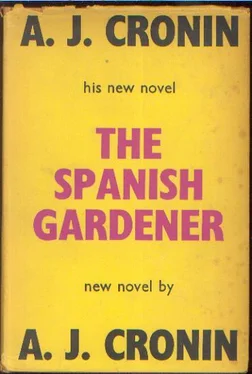Archibald Cronin - The Spanish gardener
Здесь есть возможность читать онлайн «Archibald Cronin - The Spanish gardener» весь текст электронной книги совершенно бесплатно (целиком полную версию без сокращений). В некоторых случаях можно слушать аудио, скачать через торрент в формате fb2 и присутствует краткое содержание. Жанр: Классическая проза, на английском языке. Описание произведения, (предисловие) а так же отзывы посетителей доступны на портале библиотеки ЛибКат.
- Название:The Spanish gardener
- Автор:
- Жанр:
- Год:неизвестен
- ISBN:нет данных
- Рейтинг книги:4 / 5. Голосов: 1
-
Избранное:Добавить в избранное
- Отзывы:
-
Ваша оценка:
- 80
- 1
- 2
- 3
- 4
- 5
The Spanish gardener: краткое содержание, описание и аннотация
Предлагаем к чтению аннотацию, описание, краткое содержание или предисловие (зависит от того, что написал сам автор книги «The Spanish gardener»). Если вы не нашли необходимую информацию о книге — напишите в комментариях, мы постараемся отыскать её.
The Spanish gardener — читать онлайн бесплатно полную книгу (весь текст) целиком
Ниже представлен текст книги, разбитый по страницам. Система сохранения места последней прочитанной страницы, позволяет с удобством читать онлайн бесплатно книгу «The Spanish gardener», без необходимости каждый раз заново искать на чём Вы остановились. Поставьте закладку, и сможете в любой момент перейти на страницу, на которой закончили чтение.
Интервал:
Закладка:
"Yes," she agreed warmly, with downcast eyes.
"Your chance will come," Brande suggested helpfully.
"Oh, we hope so! Don't we, honey?"
She did not answer, but directed towards her husband a glance of such intimate tenderness that the Consul, who could never see a happy marriage without thinking of the failure of his own, felt a sudden stab of pain. They had only been married eighteen months, of course, yet they were obviously deeply attached to one another. Why was it that this nervous nonentity, who stammered when anyone spoke sharply to him and was often ridiculously adolescent in his behaviour, could command such wifely affection while he, superior in every way, had failed so utterly to hold the one woman he had ever loved?
With a cynicism he scarcely would have suspected in himself, he turned to Mrs. Decker.
"It hadn't struck me before," he said, in his blandest voice, "but San Jorge must be rather a dull place for a woman."
A swift surprise showed in her grey, short-sighted eyes.
"Oh no … not at all, sir."
That she should call him "sir" made him feel old, caused him another pang.
"She has the apartment to look after," Decker said fondly. "And I must say she's made it real homey."
"Homey?" the Consul echoed in an indescribable tone.
"Yes sir. As I told you, it's small, but it's very snug."
"Still, I should imagine a young couple wouldn't find much social life here," persisted the Consul—"cramped in the back street of a dingy little Spanish town."
For the first time Carol Decker looked at him directly. Was it possible, he asked himself, that despite the amiable blankness of his expression she surmised the deeper intention of his remark? She answered quickly:
"We have lots of friends, sir, I assure you. They aren't very grand, but they're nice … the baker and the grocer, the old priest, Father Limaza, the cigarette maker downstairs. We go sailing often in the bay with Miguel, the alcalde's son. In the evenings we sometimes drop in at the Teatro—these old Spanish movies are tremendous fun—and afterwards we have supper at the Chantaco. You ought to taste the iced beer there, it's first rate. Then we've started a little club for the local boys and girls. We have ping-pong, and ninepins. I give them ice cream and Alvin even tries to teach them baseball." Her colour had risen; she went on earnestly, a little unguardedly: "We'd be so glad to see Nicholas there. He'd enjoy the other children … especially if he feels lonely out here."
After that there was a pause. The Consul's expression had turned stiff. Send Nicholas amongst these common brats, indeed! Only the sacred obligations of hospitality held back a sharp expression of his indignation.
Yet everything, thought Alvin, ingenuously, had passed off extremely well. For a little while he devoted himself, with Carol, to Nicholas; then, with a deferential air, he glanced at his watch.
"We must not keep you too long, sir. It's really time we were going."
They were about to rise when steps sounded on the cobbled yard and Nicholas, who had for some time been searching the garden with expectant glances, suddenly lost that air of preoccupation which he had worn for most of the afternoon.
"Look!" he exclaimed, eagerly. "There he is! I believe he's got some after all." And before his father could prevent him he beckoned excitedly and called out in a shrill voice: "José! José! Come over here."
There was an amazed silence. The Consul drew himself up with a heavy frown.
"What do you mean, Nicholas? Be quiet at once," he commanded harshly. But he was too late.
From the shelter of the stableyard where he was hovering, in a state of indecision, José started forward, modestly, yet with a smile of triumph, towards the group. He wore his Sunday clothes, his Catalan hat flat upon his ears, and he carried in his hand a bundle wrapped in green osiers.
Unbelievingly, his eyes fixed, lips tightly compressed, Brande stared at the advancing youth, who had materialized so unexpectedly at the summons of his son. Why was he here, on Sunday, at this hour? A strange chill fell upon him. And as if that were not enough, there was Nicholas, jumping in his seat and shouting rudely before their guests:
"Hurrah! Well done, José!"
"Will you be quiet?" Brande said again, in a low intense tone.
José had now reached the arbour, and with a little bow, like some rustic matador, he removed his absurd hat and thrust it beneath his left arm. He had smiled first to Nicholas, but now his eyes, intent and serious, were bent propitiatingly upon the Consul.
"Señor," he began, "please to pardon me for disturbing you. I bring you a small gift. The flowers were not mine, and I did wrong to pick them, for which I am sorry. But these are mine, señor, and I beg you to accept them."
Opening the bundle of osiers, he displayed, not without pride, two fine trout, plump and pinkly speckled, lying side by side on some sprigs of wild mint.
Rigid and motionless, the Consul made no response, but Nicholas, leaning forward in ardent interest, broke out with increased animation.
"What beauties, José! And such big ones. Did you get them in the mill-pool or in the fast water above.'' Tell me, quick."
As though conscious, for the first time, of all their eyes upon him, José coloured slightly and moved his heavy boots, which were bronzed with yellow dust, creased by darker lines of sweat.
"In the fast water," he answered, smiling again at Nicholas—then went on, as though explaining, to the others: "It is a stream I go to, the Arengo, far back in the mountains. High up and crystal dear, oh, most beautiful I assure you. But tie trout are difficult. All morning I thought I should catch nothing. Then just before leaving, I get these, each one more than a kilo." His warm gaze came to rest upon the Consul, he wiped the perspiration from his upper lip. "They are completely fresh, señor. I trust you will enjoy them."
Harrington Brande sat with his hands resting on the table, perfectly still—like a statue, perhaps the statue of a great man, upon a pediment in the public square. His face wore a marbled hardness too, but beneath, his pulse was pounding in his temples and all his blood seemed turned into gall.
"I am sorry," he said, at last, in a forced voice. "I never eat trout. And they are too rich for my son."
"But these are white trout, señor … the real mountain trucha …" José faltered. "Very fine and delicate …"
"Thank you, no," said the Consul, and directed his gaze with icy courtesy towards his guests. "It might be that you would care to have them?"
"Oh, not at all," Alvin Decker responded, hurriedly, in an uncomfortable voice.
"Then take them to the kitchen." The Consul returned his frozen eyes to José's dusky face. In spite of himself he could not keep a sneer from his lips nor a faint tremor from his voice. "The servants may be able to use them."
"Oh, no, Father!" Nicholas cried, in deep dismay. " José wants us to have them."
"You are on a diet. You cannot have them."
Tears started at the back of the little boy's eyes.
"But, Father …"
"Enough." The Consul's tone bit like acid. "You may leave us now, my man."
There was a short pause. José drew himself up as though fighting a sudden fatigue. His breast heaved painfully as he made the effort to speak, yet his words, though they came haltingly, had a strange and simple dignity.
"I am sorry to have displeased you, señor. I rose this morning while it was still dark and walked twelve kilometres to catch these fish for you." His orange complexion had taken on a mottled pallor and in his dark eyes there burned a sultry spark. "I should have known that they were not fine enough for you. Perhaps, therefore, you will permit me to take them home. We are very poor, señor, with many mouths to feed, and these fish would make a good meal for us."
Читать дальшеИнтервал:
Закладка:
Похожие книги на «The Spanish gardener»
Представляем Вашему вниманию похожие книги на «The Spanish gardener» списком для выбора. Мы отобрали схожую по названию и смыслу литературу в надежде предоставить читателям больше вариантов отыскать новые, интересные, ещё непрочитанные произведения.
Обсуждение, отзывы о книге «The Spanish gardener» и просто собственные мнения читателей. Оставьте ваши комментарии, напишите, что Вы думаете о произведении, его смысле или главных героях. Укажите что конкретно понравилось, а что нет, и почему Вы так считаете.












